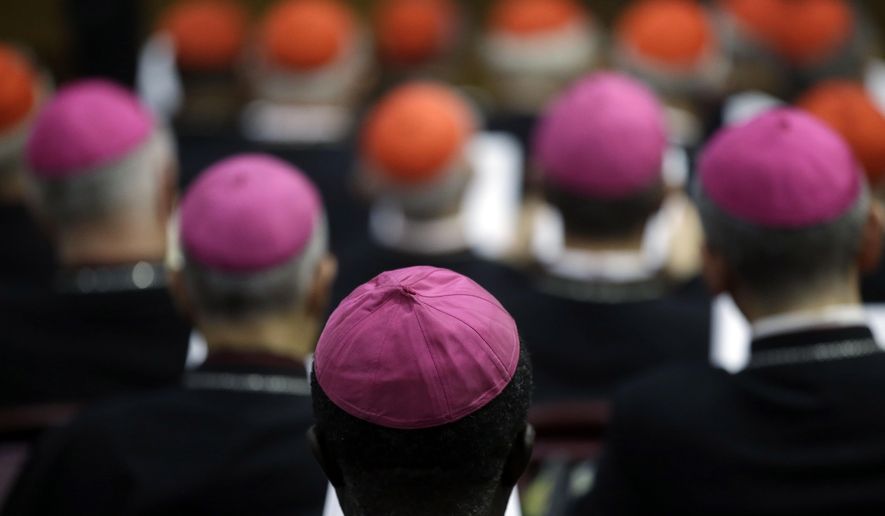Conservative Catholic leaders on Tuesday warned against unrealistic expectations after a report issued by the Vatican included language about “welcoming homosexuals” and being more understanding of non-traditional families within the church.
South African Cardinal Wilfrid Napier said he was concerned that people have “perhaps read more into the document than was intended,” referring to the midterm report which summarized the past week of discussion during the Extraordinary Synod of Bishops.
“Are the expectations perhaps of the Synod a little unrealistic and is the misinterpretation reflecting what people would like to happen, rather than what is happening or what is going to happen?” he said, according to Vatican Radio.
In an interview with Catholic World View, U.S. Cardinal Raymond Burke, prefect of the Supreme Tribunal of the Apostolic Signatura, said “a great number of the Synod Fathers found [the report] objectionable.”
“While the document in question … purports to report only the discussion which took place among the Synod Fathers, it, in fact, advances positions which many Synod Fathers do not accept and, I would say, as faithful shepherds of the flock cannot accept,” he added during the interview. In the summary is language that states that gay people have “gifts and qualities to offer to the Christian community,” and “without denying the moral problems connected to homosexual unions, it has to be noted that there are cases in which mutual aid to the point of sacrifice constitutes a precious support in the life of the partners.”
In an interview with Vatican Radio, Archbishop Stanislaw Gadecki, president of the Polish Episcopal Conference, called the report “unacceptable.”
John Smeaton, co-founder of Voice of the Family, an organization comprised of pro-life and pro-family groups started because of the synod, said criticism like Cardinal Burke’s is “welcome.”
“Catholic teaching on human sexuality and the family has been dramatically and disastrously undermined by the Vatican’s mid-way report on the synod. Catholic parents worldwide will be feeling bewildered and betrayed,” he said.
But not all Catholic leaders resisted the language in the report.
Italian Cardinal Fernando Filoni, head of the Congregation for the Evangelization of Peoples, said the high expectations were justified.
“The challenge facing bishops,” Cardinal Filoni said according to Vatican Radio, “is to encourage both those living up to the Church’s teaching on the family, as well as those parents or children living in more problematic situations.” John Grabowski, associate professor and director of moral theology and ethics at the Catholic University of America, said the reaction from conservative leaders was an attempt to “manage the message a little better, but even that was a little misguided.”
“We’re talking about a provisional statement drafted by a committee about an ongoing conversation.” Mr. Grabowski said. “There’s no doctrinal weight here. Even the bishops who are enthusiastic, they’re all saying ’You now what? We’re not changing doctrine, we’re trying to change the tone. We’re trying to get more welcoming, more hospitable, more inclusive.’ If anyone has been listening to Pope Francis, he’s said all along he’s not interested in changing doctrine, but putting more of an emphasis on love and mercy at the heart of Catholic moral teaching”
Catholic League President Bill Donohue said that regardless what side of the report Catholics are taking they’re probably confused.
“Quite frankly some of the language strikes me as psychobabble,” he said. “I think any organization … needs moral clarity. You need to know what the rules are.”
The Catholic Church teaches that gay sex is “intrinsically disordered,” that is, inherently contrary to the purpose of sex, which is the life-giving union of a man and woman permanently attached in marriage. That phrase is used to describe gay sex acts in the letter “On the Pastoral Care of Homosexual Persons,” written in 1986 by then-Cardinal Joseph Ratzinger, now Pope Emeritus Benedict XVI.
The church also teaches, according to the current catechism, that “men and women who have deep-seated homosexual tendencies … must be accepted with respect, compassion and sensitivity. … Homosexual persons are called to chastity … they can and should gradually and resolutely approach Christian perfection.”
The report will be addressed more in depth during the second half of the meeting, which is ongoing at the Vatican through Oct. 25. The synod includes more than 200 cardinals, bishops, priests, and lay people.
“There’s some real problems here,” Mr. Donohue said. “Ultimately the final document will be in 2015 and it won’t be anything like this, so that’s the good news. The bad news is that the message has been sent.”
• Meredith Somers can be reached at msomers@washingtontimes.com.




Please read our comment policy before commenting.